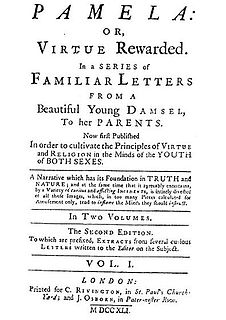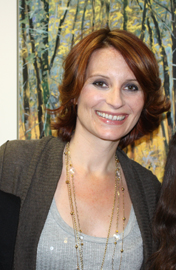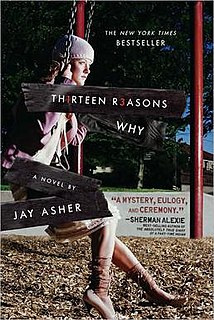
An epistolary novel is a novel written as a series of letters. The term is often extended to cover novels which intersperse documents of other kinds with the letters, most commonly diary entries and newspaper clippings, and sometimes considered to include novels composed of documents even if they don't include letters at all. More recently, epistolaries may include electronic documents such as recordings and radio, blog posts, and e-mails. The word epistolary is derived from Latin from the Greek word ἐπιστολή epistolē, meaning a letter. In German, this type of novel is known as a Briefroman.

Go Ask Alice is a 1971 book about a teenage girl who develops a drug addiction at age 15 and runs away from home on a journey of self-destructive escapism. Attributed to "Anonymous", the book is in diary form, and was originally presented as being the edited "real diary" of the unnamed teenage protagonist. Questions about the book's authenticity and true authorship began to arise in the late 1970s, and Beatrice Sparks is now generally viewed as the author of the found manuscript–styled fictional document. A therapist, Sparks went on to write numerous other books purporting to be real diaries of troubled teenagers. Some sources have also named Linda Glovach as a co-author of the book. Nevertheless, its popularity has endured, and as of 2014 it had remained continuously in print since its publication over four decades earlier.

The Princess Diaries is a 2001 American coming-of-age comedy film produced by Walt Disney Pictures and directed by Garry Marshall. Loosely based on Meg Cabot's 2000 young adult novel of the same name, the film was written by Gina Wendkos and stars Anne Hathaway and Julie Andrews, with a supporting cast consisting of Héctor Elizondo, Heather Matarazzo, Mandy Moore, Caroline Goodall and Robert Schwartzman. The film follows Mia Thermopolis (Hathaway), a shy American teenager who learns she is heir to the throne of a European kingdom. Under the tutelage of her estranged grandmother (Andrews), the kingdom's reigning queen, Mia must decide whether to claim the throne she has inherited or renounce her title permanently.

The Last Book in the Universe is a 2000 post-apocalyptic science fiction novel by Rodman Philbrick. Set in a cyberpunk dystopia, its protagonist and narrator is a teenage boy named Spaz who suffers from epilepsy.

Meggin Patricia Cabot is a prolific American novelist. She has written and published over 50 novels of young adult and adult fiction, and is best known for her young adult series Princess Diaries, which was later adapted by Walt Disney Pictures into two feature films. Cabot has been the recipient of numerous book awards, including the New York Public Library Books for the Teen Age, the American Library Association Quick Pick for Reluctant Readers, the Tennessee Volunteer State TASL Book Award, the Book Sense Pick, the Evergreen Young Adult Book Award, the IRA/CBC Young Adult Choice, and many others. She has also had numerous number one New York Times bestsellers, and more than 25 million copies of her books are in print across the world.
Fiction writing is the composition of non-factual prose texts. Fictional writing often is produced as a story meant to entertain or convey an author's point of view. The result of this may be a short story, novel, novella, screenplay, or drama, which are all types of fictional writing styles. Different types of authors practice fictional writing, including novelists, playwrights, short story writers, radio dramatists and screenwriters.
The Princess Diaries is a series of epistolary young adult novels written by Meg Cabot, and is also the title of the first volume, published in 2000. The series revolves around Amelia 'Mia' Thermopolis, a teenager in New York who discovers that she is the princess of a small European principality called Genovia. The series follows Mia's life throughout high school in the 2000s and juggling regular teenage life with being a royal princess. The books are noted for containing many popular culture references from the 2000s that influence some of the plot.

Teen Idol was written by Meg Cabot and published in July 2004 in hardcover edition and in August 2005 in paperback edition.
Denise Vega is an author of young-adult novels and of children's picture books and a faculty member at Regis University. Her debut novel, Click Here : , was released in December 2007 by Little, Brown.

A Mango-Shaped Space is a 2003 young adult novel by the American author Wendy Mass. A Mango-Shaped Space is Mass's fourth fiction novel. The book received the American Library Association Schneider Family Book Award in 2004. The novel has since been nominated for, and received, a number of other awards. The hand lettering on the cover is by Billy Kelly. The book is recommended for grades 5-8. A 7-hour long audiobook version, narrated by Danielle Ferland, has been produced.

The Boy Next Door is a novel written by Meg Cabot. The book was published in 2002. It is written with an e-mail format throughout the book.

Ready or Not is the sequel to the novel All-American Girl. Both were written by Meg Cabot, who is also the author of The Princess Diaries. The book takes place about one year after the events of All-American Girl.
Young adult romance literature is a genre of books written for teenagers. As defined by Romance Writers of America, a romance novel consists of a central love story and an emotionally satisfying ending. Early young adult romances feature a teenage protagonist, who is typically female, white, and middle-class, while books in the twenty-first century include a wider variety of protagonist.

Thirteen Reasons Why is a young adult novel written by Jay Asher in 2007, that follows the story of Hannah Baker, a high school freshman, and the thirteen reasons why she commits suicide. Following her death, Hannah leaves behind a series of 7 double-sided cassette tapes detailing the 13 specific people and events that she blames for her demise. Two weeks after her death these cassette tapes are mailed out with directions to pass the tapes on to the next person on the tape. Hannah's life story is conveyed through these tapes, which are narrated by Hannah herself, and through the point of view of Clay, her classmate and the ninth person to receive the tapes. The inspiration behind the main character, Hannah Baker, comes from author Jay Asher's close relative who attempted suicide.

Dork Diaries is a children's book series written and illustrated by Rachel Renée Russell.

The Popularity Papers is a middle grade book series written and illustrated by Amy Ignatow. The first book of the series was published in 2010. To date, six sequels have been published.
- Book one: Research for the Social Improvement and General Betterment of Lydia Goldblatt and Julie Graham-Chang
- Book two: The Long-Distance Dispatch Between Lydia Goldblatt and Julie Graham-Chang
- Book three: Words of (Questionable) Wisdom from Lydia Goldblatt and Julie Graham-Chang
- Book four: The Rocky Road Trip of Lydia Goldblatt and Julie Graham-Chang
- Book five: The Awesomely Awful Melodies of Lydia Goldblatt and Julie Graham-Chang
- Book six: Love and Other Fiascos with Lydia Goldblatt and Julie Graham-Chang
- Book seven: The Less-Than-Hidden Secrets and Final Revelations of Lydia Goldblatt and Julie Graham-Chang

Yaqui Delgado Wants to Kick Your Ass is a 2013 award-winning young adult book by Cuban-American author Meg Medina. The book was first published in the United States on 26 March 2013 through Candlewick Press and is the winner of the 2013 Cybils Award and the 2014 Pura Belpré Award. The book has been challenged in some schools due to its title and language, and deals with the theme of teen bullying and its effects on the individual and their lives.

From the Notebooks of a Middle School Princess is a 2015 children's novel written and illustrated by Meg Cabot and a spinoff of the author's young adult fiction series, The Princess Diaries. The book was released on May 19, 2015 through Feiwel & Friends and follows Olivia, a bi-racial 12-year-old who finds out she is the paternal younger half-sister of Princess Mia Thermopolis.

The Dark Prophecy is an American fantasy novel based on Greek and Roman mythology written by American author Rick Riordan. It was published on May 2, 2017, and is the second book in The Trials of Apollo series, the second spin-off of the Percy Jackson & the Olympians series. The book and its cover art by John Rocco were first announced in 2016. It has been published in hardcover, paperback, audiobook, ebook, and large-print editions. To date, The Dark Prophecy has been translated into 7 languages from its original English.
Jennifer Mathieu is an American author of young adult fiction. Her novel Moxie was adapted into a film of the same name.















